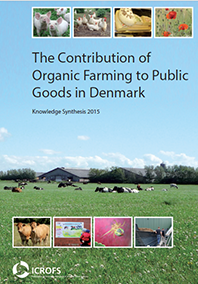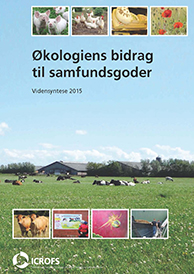Knowledge Syntheses
Since 1998, ICROFS/FØJO has published 18 knowledge syntheses about key areas within organic farming and food systems
Knowledge syntheses
Knowledge syntheses play an important role in the development and the communication of research taking place in ICROFS. A knowledge synthesis can be a useful tool in the preparation of new research projects, in clarifying particular problems, and for creating a more comprehensive, overall perspective on a specific subject, which draws on both the available scientific knowledge and practical experience.
Knowledge syntheses 2015
In close cooperation with ICROFS, a wide range of Danish scientists published a knowledge synthesis in September 2015.
The purpose of the knowledge synsthesis was to analyse, discuss and synthesise the existing knowledge on the organic contribution to society on themes such as biodiversity, animal welfare, human health and environment.
The conclusions of the knowledge synthesis are summarised in:
"The Contribution of Organic Farming to Publich Goods in Denmark"
18 knowledge syntheses from ICROFS so far
> Go to Knowledge Synthesis 2008: "Development, growth, and integrity in the Danish organic sector - A knowledge synthesis on the opportunities and barriers for a continued development and market-based growth in production, processing, and sale of organic products"
Since 1998, ICROFS has carried out eighteen knowledge syntheses on key issues in organic farming and food systems (only available in Danish):
- the market for organic products 2023 - drivers and barriers for growth
- nutrient supply and recirculation in organic production
- perspectivation of the analysis of the market, nutrient supply and recirculation, and green proteins to feed and food
- professional guide for organic plant breeders
- nitrogen leaching and balances in conventional and organic production systems
- health and welfare in organic milk production
- opportunities and barriers in organic pig production
- nature quality in organic agriculture
- groundwater protection and organic conversion
- organic food and human health
- breeding of grain and pulses and production of seed in organic agriculture
- consequences of genetically modified crops for organic agriculture
- reduction of fossil energy use and production of renewable energy in organic agriculture
- opportunities for organic fish production in Denmark
- challenges and prospects in the global development of organic agriculture
- opportunities and barriers for continued development, growth and integrity in the Danish organic sector (2008)
Vidensyntese 2015
I 2015 udarbejdede ICROFS udarbejdet en vidensyntese i samarbejde med en bred vifte af danske forskere. Formålet har været at kortlægge den eksisterende viden om økologiens bidrag til fælles samfundsgoder som biodiversitet, dyrevelfærd, human sundhed, miljø og klima.
Vidensyntesen "Økologiens bidrag til samfundsgoder"
udkom forbindelse med Økologi-Kongres 2015.
- Læs vidensyntesen: Økologiens bidrag til samfundsgoder, 2015
- Læs: Kort version af vidensyntesen 2015 med resume og konklusioner
- Få et overblik over samtlige vidensynteser
Læs også omtale fra lanceringen af vidensyntesen på Økologi-Kongres 2015:
- Omfattende præsentation af ny vidensyntese på økologikongressen
- ICROFS-formand: Vidensyntesen kan blive et vigtigt politisk redskab
- Forskningen viser, at økologien har værdi for samfundet
- Kongres stemte om økologiens svære spørgsmål
- Vidensyntese om økologiens samfundsværdi som gratis e-bog
Baggrund for "Økologiens bidrag til samfundsgoder"
Det er almindeligt kendt, at den økologiske produktionsform påvirker en række fælles samfundsgoder såsom biodiversitet, miljøforhold, klima, sundhed og velfærd for mennesker og dyr samt udviklingen i landdistrikterne. Men der var behov for et forskningsbaseret overblik over den eksisterende viden om den danske økologiske sektors bidrag til disse forskellige samfundsgoder, og hvordan de spiller sammen til en helhed.
NaturErhvervstyrelsen bestilte derfor i foråret 2015 en vidensyntese, der skulle kortlægge den eksisterende viden om økologiens bidrag til samfundsgoderne i Danmark. Ca. 70 danske forskere og eksperter var involveret i arbejdet. Formålet var at give politikere og andre interessenter et bedre grundlag for at træffe beslutninger om, hvordan økologien kan bruges som et videnskabeligt funderet, samfundsnyttigt værktøj.
Den overordnede konklusion er, at økologien bidrager positivt til at sikre samfundsgoder som biodiversitet, jordens frugtbarhed og dyrevelfærd, men også at der er andre områder, for eksempel klima-påvirkning, hvor der er behov for mere fokus og udvikling.
Tidligere vidensynteser
ICROFS har udgivet en række vidensynteser om forskellige emner.
Se alle tidligere vidensynteser her
Vidensyntesen 2015
Sammendrag af konklusionerne
Hent sammendraget af konklusionerne
fra "Økologiens bidrag til samfundsgoder"
- publiceret oktober 2015, 2.udgave
Præsentationer
Se præsentationerne fra mødet på Christiansborg
d. 22. april. om vidensyntesen og "Ny viden om Økologi":
Præsentation af "Ny viden om økologi"
v. Niels Halberg
Præsentation af Vidensyntesen - økologiens betydning for samfundsgoder

